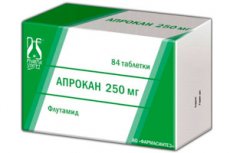新出版物
阿普洛康
最近審查:04.07.2025

Aprocan(氟他胺)是一种抗雄激素类药物。它用于治疗前列腺癌,尤其适用于与其他药物或疗法(例如睾丸切除手术或放射疗法)联合使用。
氟他胺通过阻断体内雄性激素睾酮的作用发挥作用。前列腺癌通常依赖于睾酮的生长。通过阻断睾酮的作用,氟他胺可以帮助减缓或阻止肿瘤的生长。
该药物通常以药丸形式服用,通常与其他药物或疗法联合使用。务必在医生指导下使用,因为它可能引起副作用并与其他药物发生相互作用。
適應症 Aprocana
Aprocan(氟他胺)用于治疗前列腺癌。该药物通常作为联合疗法的一部分,与其他药物或疗法(例如睾丸切除术或放射疗法)联合使用。
前列腺癌的生长通常依赖于男性性激素,例如睾酮。氟他胺是一种抗雄激素药物,可以阻断体内睾酮的作用。这有助于减缓或阻止肿瘤生长,并可能有效控制前列腺癌。
Aprocan 通常用于前列腺癌已转移(扩散至其他器官)的患者或对其他药物或治疗没有反应的患者。
發布表單
Aprokan(氟他胺)通常以口服片剂形式提供。片剂含有特定剂量的活性成分氟他胺。
根据医生的建议和患者的个人需求,这些药片有不同的剂量。
通常,药物以包含一定数量药片的包装形式提供,并附有使用和储存说明。
藥效學
Aprokan 的有效成分氟他胺是一种抗雄激素,这意味着它可以阻断男性性激素(尤其是睾酮)的作用。前列腺癌的生长通常依赖于睾酮,而氟他胺有助于减缓或阻止这一过程。
氟他胺的作用机制是与睾酮竞争前列腺组织中的雄激素受体结合。由于睾酮无法与雄激素受体结合,因此雄激素刺激的生理过程(例如前列腺肿瘤的生长)会被减缓或停止。
氟他胺的雄激素作用较睾酮弱,因此阻断其作用不会导致前列腺癌进展。然而,氟他胺可能引起与雄激素作用减弱相关的不良反应,例如男性乳房发育症(男性乳腺增大)、性欲下降、高血压,以及罕见的肝毒性。
总体而言,氟他胺的药效学在于其抑制雄激素作用的能力,这使其在治疗前列腺癌方面有效。
藥代動力學
- 吸收:氟他胺口服后经胃肠道吸收良好,通常在服药后2-5小时达到血药峰浓度。
- 生物利用度:氟他胺的生物利用度约为90%。
- 分布:氟他胺分布容积大,这意味着它分布于身体各个组织和器官,包括前列腺。94-96%的氟他胺与血浆蛋白结合。
- 代谢:氟他胺在肝脏中经过强烈代谢,形成活性代谢物2-羟基氟他胺,该活性代谢物具有生物活性并具有抗雄激素作用。
- 排泄:氟他胺主要通过肝脏代谢,经肾脏排出体外。约4-6%的剂量以原形经肾脏排出。
- 消除半衰期:氟他胺在体内的消除半衰期约为6小时。
劑量和管理
- 剂量:成人通常建议起始剂量为250毫克(一片),每日三次。但医生可能会根据您的病情和治疗反应调整剂量。
- 使用方法:氟他胺片通常用水送服。建议饭后服用。
- 治疗持续时间:治疗持续时间和剂量方案将由您的医生根据您的疾病性质和严重程度决定。
禁忌
- 超敏反应:任何已知对氟他胺或该药物其他成分的超敏反应均禁止使用该药物。
- 肝炎或肝功能障碍:肝功能障碍患者或既往有肝炎病史的患者应谨慎使用或避免使用该药物。
- 高胆红素血症:高胆红素血症患者也应慎用该药。
- 妊娠和哺乳期妇女:氟他胺禁用于孕妇,因为它可能导致胎儿出生缺陷。它也禁用于哺乳期妇女,因为它可能会分泌到母乳中。
- 症状性低血压:有症状性低血压的患者应慎用该药,因为它可能会导致血压下降。
- 患有神经或精神疾病的患者:对于这些患者,使用氟他胺也需要谨慎,因为它可能会对神经系统产生影响。
副作用 Aprocana
- 胃肠道疾病:包括恶心、呕吐、腹泻、食欲紊乱和消化不良。
- 男性乳房发育症:由于氟他胺具有抗雄激素作用,其副作用之一可能是男性乳腺增大。
- 性欲下降:氟他胺可能会导致某些患者的性欲下降。
- 高血压:一些患者可能会出现血压升高。
- 高催乳素血症:血液中催乳素水平升高会导致月经不调或高催乳素血症性腺功能低下。
- 肝毒性:在极少数情况下,氟他胺可能会导致肝损伤或肝炎。
- 神经系统影响:包括嗜睡、头晕、乏力、头痛和感觉障碍。
- 血尿素和肌酐升高:部分患者可能会出现此症状。
- 皮肤反应:包括皮疹、瘙痒和罕见的荨麻疹。
- 体重增加:一些患者可能会出现体重增加。
過量
- 嗜睡和全身无力:这可能是过量服用的最初迹象之一。
- 胃肠道疾病:包括恶心、呕吐和腹泻。
- 头晕和头痛:这些症状的强度增加可能表明服用过量。
- 低血压:这可能会导致头晕甚至昏厥。
- 毒性代谢物水平升高:如果服用过量,体内氟他胺的活性代谢物浓度可能会升高,从而导致额外的毒性作用。
與其他藥物的相互作用
- 华法林(抗血小板药物):氟他胺可能会增强华法林的抗凝作用,从而增加出血风险。需要频繁监测凝血酶原时间。
- 环孢菌素(免疫抑制剂):氟他胺可能会增加血液中的环孢菌素浓度,从而导致毒性作用。
- 茶碱(支气管扩张剂):氟他胺可能会增加茶碱的血液浓度,从而增加其毒性作用。
- 克拉霉素和红霉素(大环内酯类抗生素):这些抗生素可能会增加血液中的氟他胺浓度,从而增加其毒性作用。
- 哌甲酯(用于治疗注意力缺陷多动障碍的药物):氟他胺可能会增加哌甲酯的血液浓度,从而导致效果增强或副作用。
注意!
為了簡化對信息的理解,本指令使用了藥物 "阿普洛康",並根據藥物的醫療用途官方說明。 使用前請閱讀直接用於藥物的註釋。
描述僅供參考,不適用於自我修復指導。 這種藥物的需求,治療方案的目的,藥物的方法和劑量僅由主治醫師確定。 自我藥療對你的健康有危害。

